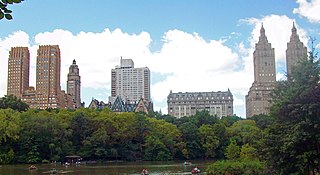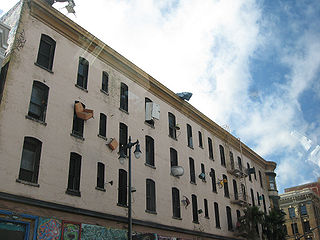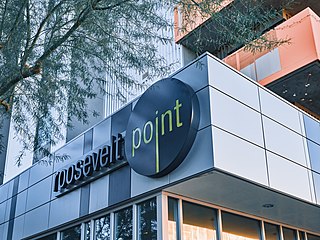Professional certification, trade certification, or professional designation, often called simply certification or qualification, is a designation earned by a person to assure qualification to perform a job or task. Not all certifications that use post-nominal letters are an acknowledgement of educational achievement, or an agency appointed to safeguard the public interest.
This aims to be a complete list of the articles on real estate.
A homeowner association, or a homeowner community, is a private association-like entity in the United States, Canada, the Philippines and certain other countries often formed either ipso jure in a building with multiple owner-occupancies, or by a real estate developer for the purpose of marketing, managing, and selling homes and lots in a residential subdivision. The developer will typically transfer control of the association to the homeowners after selling a predetermined number of lots.
Housing tenure is a financial arrangement and ownership structure under which someone has the right to live in a house or apartment. The most frequent forms are tenancy, in which rent is paid by the occupant to a landlord, and owner-occupancy, where the occupant owns their own home. Mixed forms of tenure are also possible.

A condominium is an ownership regime in which a building is divided into multiple units that are either each separately owned, or owned in common with exclusive rights of occupation by individual owners. These individual units are surrounded by common areas that are jointly owned and managed by the owners of the units. The term can be applied to the building or complex itself, and is sometimes applied to individual units. The term "condominium" is mostly used in the US and Canada, but similar arrangements are used in many other countries under different names.

A housing cooperative, or housing co-op, is a legal entity, usually a cooperative or a corporation, which owns real estate, consisting of one or more residential buildings; it is one type of housing tenure. Typically housing cooperatives are owned by shareholders but in some cases they can be owned by a non-profit organization. They are a distinctive form of home ownership that have many characteristics that differ from other residential arrangements such as single family home ownership, condominiums and renting.
Property management is the operation, control, maintenance, and oversight of real estate and physical property. This can include residential, commercial, and land real estate. Management indicates the need for real estate to be cared for and monitored, with accountability for and attention to its useful life and condition. This is much akin to the role of management in any business.

Single-room occupancy (SRO) is a type of low-cost housing typically aimed at residents with low or minimal incomes, or single adults who like a minimalist lifestyle, who rent small, furnished single rooms with a bed, chair, and sometimes a small desk. SRO units are rented out as permanent residence and/or primary residence to individuals, within a multi-tenant building where tenants share a kitchen, toilets or bathrooms. SRO units range from 7 to 13 square metres. In some instances, contemporary units may have a small refrigerator, microwave, or sink.
Landlord harassment is the willing creation, by a landlord or their agents, of conditions that are uncomfortable for one or more tenants in order to induce willing abandonment of a rental contract. This is illegal in many jurisdictions, either under general harassment laws or specific protections, as well as under the terms of rental contracts or tenancy agreements.
In the field of commercial real estate, especially in the United States, a net lease requires the tenant to pay, in addition to rent, some or all of the property expenses that normally would be paid by the property owner. These include expenses such as property taxes, insurance, maintenance, repair, and operations, utilities, and other items. These expenses are often categorized into the "three nets": property taxes, insurance, and maintenance. In US parlance, a lease where all three of these expenses are paid by the tenant is known as a triple net lease, NNN Lease, or triple-N for short and sometimes written NNN.

A letting agent is a facilitator through which an agreement is made between a landlord and tenant to rent a residential property. This is commonly used in countries using British English, including countries of the Commonwealth. In the UK, Australia, and New Zealand, the agreement between landlord and tenant is normally formalised by the signing of a tenancy agreement. A letting agency normally charges a commission for their services, usually a percentage of the monthly rent.
The Real Property Administrator (RPA) designation is a professional designation for commercial property managers awarded to people with several years of experience and completing the Building Owners and Managers Association advanced study program. The designation is administered by Building Owners and Managers Institute (BOMI) International, an independent nonprofit institute for property and facility management education. The program covers all aspects of operating a commercial property and maximizing a net income while minimizing risk.
A community association manager is a manager of a condominium or homeowners association. The position is frequently confused with a property manager, who deals with individual rental units or a group of rental units, like an apartment complex. The community manager deals with property owners and homeowners.
Equity Residential is a United States-based publicly traded real estate investment trust that invests in apartments.
A security deposit is a sum of money held in trust.
Lease administration is a department that usually falls under an organization's real estate department. Lease administration involves receiving rents from facilities they own and paying rent for the facilities they lease, and other activities. It has become an integral part of the accounting, administrative, and legal requirements normally associated with a real estate portfolio. Job responsibilities for lease administrators and real estate professionals include: lease review and abstracting, accounting and processing, lease audits, CAM charges, lease renewal options, repairs and maintenance, information management and reporting, occupancy cost analysis, operating expense review, and document storage and maintenance.

A common area is, in real estate or real property law, the "area which is available for use by more than one person..." The common areas are those that are available for common use by all tenants, (or) groups of tenants and their invitees. In Texas and other parts of the United States, it is "An area inside a housing development owned by all residents or by an overall management structure which charges each tenant for maintenance and upkeep."
The National Apartment Association (NAA) is a non-profit trade association in the United States of apartment communities, owners and vendors. These member companies are also part of NAA with their membership at the local level. Members represent the various facets of the multifamily housing industry: apartment owners, management executives, developers, builders, investors, property managers, leasing consultants, maintenance personnel, vendors and related business professionals throughout the United States and Canada. NAA has its headquarters in Arlington, VA. Robert Pinnegar currently serves as the organization's president and chief executive officer.
Common area maintenance charges (CAM) are one of the net charges billed to tenants in a commercial triple net (NNN) lease, and are paid by tenants to the landlord of a commercial property. A CAM charge is an additional rent, charged on top of base rent, and is mainly composed of maintenance fees for work performed on the common area of a property

Greystar Real Estate Partners is an international real estate developer and manager based in the United States. As of 2023, Greystar had over $76 billion in gross assets under management, and operated in 17 countries.





